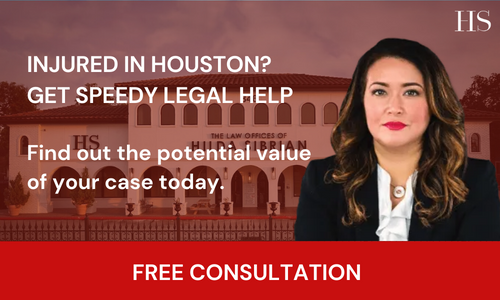Riding a motorcycle drunk is dangerous and illegal. Riding a bike already comes with its challenges and risks, which skyrocket when you add alcohol into the mix.
Throughout this blog, we’ll cover some essential aspects associated with the topic of riding a motorcycle under the influence:
- Motorcycle DUI Dangers
- Legal Motorcycle DUI Consequences in Texas
- Drinking and Riding Consequences: Personal Injuries
- Tips to Avoid Motorcycle Alcohol-Related Accidents
But before we dive into the drunken motorcycle riding hazards, it’s crucial to know this. Suppose you or a loved one have been involved in an accident related to a drunk driver. In that case, you have the right to fair compensation since everyone can seek compensation for personal injuries, even aliens or tourists. It’s advisable to reach out to an experienced accident lawyer.
At The Law Offices of Hilda Sibrian™, we’re ready to assist you. You don’t have to pay out of pocket when you hire us. Contact us for your free consultation. We’re available every day of the year, any time.
Motorcycle DUI Dangers
Motorcycle riding requires precise skills, full attention, and quick reaction abilities. These abilities are severely compromised when you consume alcohol. Here’s why you should never operate a motorcycle after drinking, emphasizing the risks of intoxicated motorcycle driving:
- Legal consequences. In Texas, it’s illegal to operate a motorcycle with a blood alcohol concentration (BAC) of 0.08% or higher. If caught riding under the influence, you could face severe penalties, including fines, license suspension, and jail time.
- Slow reaction time. Alcohol significantly impairs reaction time, making it difficult to respond promptly to unexpected traffic situations like sudden light changes, unexpected pedestrians, or the need to dodge obstacles on the road. Depth and distance perceptions are affected, hindering the rider’s ability to detect or react to other vehicles correctly.
- Reduced concentration. Concentration is crucial for safe riding, especially for motorcyclists who are more vulnerable on the road. Riding a motorcycle and consuming alcohol reduces the rider’s concentration, leading to unintentional lane drifting, riding at inappropriate speeds, failure to maintain a safe distance from other vehicles, and not correctly obeying traffic signals.
- Lack of coordination. Coordination is essential for motorcycle riding. Alcohol inhibits the ability to coordinate movements and decisions, leading to erratic maneuvers such as lane changes without signaling or abrupt turns. These behaviors affect the rider and other drivers on the road.
- Impaired judgment. Alcohol impairs judgment, causing riders to make reckless and dangerous decisions. This includes driving excessively, making risky overtakes, and disregarding traffic rules. Lack of proper judgment significantly increases the risk of accidents, endangering the rider’s and other road users’ lives.
- Distracted driving. Under the influence of alcohol, the likelihood of the rider getting distracted by unrelated activities such as using a mobile phone, changing the radio station, or talking to passengers increases. Distracted driving is hazardous for motorcyclists as they require their full attention to ride safely and avoid accidents.
- Serious injuries. Motorcycle accidents are often more severe than car accidents due to the lack of protection. Riding under the influence increases the chances of sustaining severe injuries or even fatalities in the event of a crash. These injuries can have long-lasting physical, emotional, and financial consequences.
Legal Motorcycle DUI Consequences in Texas
In Texas, there are clear limits and penalties for those who break the rules regarding drinking and driving, with zero tolerance, especially for drivers under 21 years old. Here are the critical aspects of Texas legislation for penalizing drivers who have been drinking alcohol:
- Legal intoxication is when the blood alcohol concentration reaches or exceeds 0.08 %.
- Penalties for DWI (Driving While Intoxicated) vary depending on the offense.
- First DWI offense: A fine of up to $2,000, up to 180 days in jail (with a minimum of three mandatory days), and a driver’s license suspension for up to one year.
- Second offense: A fine of up to $4,000, one month to one year in jail after conviction, and a driver’s license suspension for up to two years.
- Third offense: A fine of $10,000, two to ten years in prison, and a driver’s license suspension for up to two years.
- These fines are in addition to a possible state fine of $3,000, $4,500, or $6,000 assessed at sentencing.
- Driving while intoxicated with children under 15 years old is considered endangering a child, resulting in a fine of up to $10,000, up to two years in jail, and an additional driver’s license suspension for 180 days.
- It is illegal to have an open alcohol container in your vehicle in Texas, regardless of whether the driver is under the influence or not.
These laws aim to deter drinking and driving by imposing strict penalties to ensure the safety of all road users. Understanding and following these laws is essential to avoid serious legal consequences and protect lives on the road.
Drinking and Riding Consequences: Personal Injuries
Driving under the influence of alcohol is one of the leading causes of traffic accidents in Texas, and its consequences can be dire for motorcyclists. The combination of motorcyclists’ vulnerability (as they only have the protection of a helmet) and impaired reaction times due to alcohol can result in severe or even fatal injuries. Below, we outline some of the most common injuries that occur in traffic accidents involving drunk motorcycle riders.
- Traumatic Brain Injuries (TBI). These are caused by sudden impact or penetration of the skull, resulting in damage to the brain. TBIs can lead to a range of symptoms, from mild concussions to severe cognitive impairments and state of coma.
- Spinal Cord Injuries. Damage to the spinal cord can result in paralysis, loss of sensation, and impaired motor function below the injury site. These injuries often have permanent effects on mobility and quality of life.
- Fractures. Motorcycle accidents frequently cause fractures or breaks in bones, including arms, legs, ribs, and the pelvis. Depending on the severity and location of the fracture, extensive medical treatment and rehabilitation may be required.
- Facial injuries. Facial trauma is common in motorcycle accidents and can include fractures of the jaw, nose, or cheekbones, as well as soft tissue injuries such as cuts, bruises, and dental damage. Severe facial injuries may require reconstructive surgery to restore function and appearance.
- Whiplash and neck injuries. A motorcycle accident’s sudden deceleration or impact can cause whiplash, a soft tissue injury to the neck. Neck injuries may also involve damage to the cervical spine, resulting in pain, stiffness, and reduced range of motion.
- Psychological trauma. Motorcycle accidents can cause significant psychological distress, including post-traumatic stress disorder (PTSD), anxiety, depression, and other mental health issues. Coping with the aftermath of a traumatic accident can be challenging and may require professional support and therapy.
- Death. Tragically, some motorcycle accidents result in fatalities. The combination of high speeds, lack of protective barriers, and impaired judgment due to alcohol consumption increases the risk of fatal injuries for both motorcyclists and other road users.
These injuries underscore the importance of responsible riding and the severe consequences of driving under the influence of alcohol. Preventing DUI motorcycle accidents requires adherence to traffic laws, sober decision-making, and prioritizing safety on the road.
Tips to Avoid Motorcycle Alcohol-Related Accidents
The combination of motorcycles and alcohol consumption is one of the leading causes of severe traffic accidents. To reduce impaired motorcycling perils, the Texas Department of Transportation recommends considering the following safety measures:
- Designate a sober driver. Before heading out, designate a sober driver who will refrain from consuming alcohol for the duration of the outing and will be responsible for driving everyone home safely.
- Use public transportation or ride-sharing services. If you plan on drinking, consider using public transportation or ride-sharing services like Uber or Lyft to get home safely instead of driving yourself.
- Plan. If you’re attending an event where alcohol will be served, plan your transportation. Arrange for a ride home or identify nearby accommodations where you can stay if necessary.
- Limit alcohol consumption. Pace yourself and drink alcohol responsibly. Know your limits and avoid excessive drinking to maintain control over your actions and judgment.
- Stay hydrated and eat. Alternate alcoholic beverages with non-alcoholic drinks like water or soda, and eat food while drinking to help slow the absorption of alcohol into your bloodstream.
- Be aware of medications. Some medications can interact with alcohol and impair your ability to drive safely. If you’re taking medication, consult your healthcare provider to determine if it’s safe to drink alcohol.
- Watch out for others. If you’re hosting a gathering where alcohol is served, monitor your guests’ alcohol intake and intervene if someone appears intoxicated. Offer alternative transportation options if necessary.
- Know the signs of impairment. Familiarize yourself with the signs of alcohol impairment, such as slurred speech, impaired coordination, and slowed reaction time. If you notice these signs in yourself or others, avoid driving and seek alternative transportation.
- Be responsible. Remember that driving under the influence endangers your life and the lives of others on the road. Be accountable and prioritize safety by avoiding alcohol consumption if you plan to drive.
These tips can help prevent alcohol-related accidents and promote safer roads for everyone in Texas.
The Law Offices of Hilda Sibrian™, Your Ally against Drunk Riding Hazards
If you’ve been in an accident caused by a drunk driver, your health is the most important thing. So, the first thing you need to do is seek immediate medical attention. Even if you feel fine, it’s essential to see a doctor and get a proper diagnosis of your condition (make sure to ask for a copy of the diagnosis).
Once you’ve received medical care, calling a law firm specializing in injury accidents is crucial. Hilda Sibrian®, the attorney who knows Texas inside and out, leads The Law Offices of Hilda Sibrian™, a law firm with over 20 years of experience helping our people in Texas get the maximum compensation they legally deserve.
Now you know the risks of riding a motorcycle drunk, please be careful when driving and avoid drinking before. Your family awaits at home. Our lawyers are ready to assist you if you’ve faced a motorcycle accident. Contact us and book your free consultation. We’re available every day of the year, at any time.










